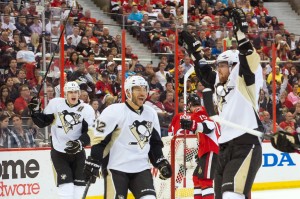When the 2012 playoffs began, many considered the Penguins to be the odds on favorites to capture Lord Stanley’s Cup. Unfortunately for Pittsburgh, nobody told the hated Philadelphia Flyers, who goaded their cross-state rivals into a game that wasn’t necessarily suited for the ultra-skilled Pens. The resulting implosion of arguably the league’s most talented team turned what once looked to be a promising postseason run into a 3-0 first round deficit and eventual six game flame out.
Fast forward to the 2013 postseason. The Pens again entered the tournament as one of the favorites to bring home a championship. The first round, though, didn’t go as smoothly as anticipated. The upstart Islanders gave the Penguins all they could handle but, unlike what happened in last year’s meltdown, Pittsburgh was able to persevere in six games.

In the second round, Pittsburgh basically had their way with the Senators. However, Ottawa’s dramatic Game 3 comeback provided some temporary question marks for the East’s top seed. As in the first round, though, the Penguins were able to overcome the adversity and move on, this time in five games.
As the Eastern Conference Finals transition to Boston for Games 3 and 4, though, the Penguins task ahead is more comparable to climbing Mount Everest than the mole hills they faced in the first two rounds. Despite how many experts picked the Penguins to prevail in this series (as a disclaimer, the term “expert” is used loosely here as a reference to almost any ESPN hockey analyst or writer), Pittsburgh has been entirely frustrated by a Boston club that has shut down what had been the most potent squad of the first two rounds in these playoffs.
Game 1
The Penguins actually dictated the play early in Game 1 but, when they were unable to capitalize on their chances, things began to resemble that forgettable Flyers series from a year ago. After clanging a few pucks off the post and some excellent play in net by Tukka Rask, things began to unravel. All of a sudden, Sidney Crosby was perceived as a whiner again, Evgeni Malkin couldn’t keep his temper in check and there was an alleged goaltending controversy brewing. A single game into the Conference Finals and one would think the sky was falling in Pittsburgh (how’s that for foreshadowing?)
And, yet, there was an optimism shining brightly from the Penguins’ locker room leading up to Game 2. To a man, the Penguins believed they had played well enough to win the first contest, that there were a few details to straighten out but that they would be alright in the long run:
“I think we played a pretty good game to start off with. We kind of got away from the plan a little bit in the third period. Clean that up, and we’ll be good.” – Douglas Murray, following Game 1
In the short-term, anyway, they were wrong.
Game 2
If Game 1 was about missed opportunities and the subsequent frustration that boiled over (as opposed to, you know, an elite Boston squad that eventually imposed its will on the Pens), then Game 2 was nothing more than an epic meltdown in which nobody really came to play. But, before we discuss Monday night’s debacle, let’s look back to 2009. Remember Game 7 against the Washington Capitals?
That save, without question, gave everyone on the Pittsburgh bench the confidence they needed in their goaltender that night. The result was an eventual lopsided 6-2 Penguins victory, one that catapulted the club to their first Stanley Cup title since 1992.
Last night, a similar opportunity took place less than a minute into the game. Only this time, Tomas Vokoun was unable to stop Brad Marchand on a breakaway and, from there, things quickly unraveled for the home team. Now, is this to say that, had Vokoun come up with the save, the outcome would have been different? Not necessarily, though it certainly may have boosted the confidence of a Penguin team that was already (and still is) struggling to find the back of the net.
And while the goaltending wasn’t spectacular, the outcome certainly shouldn’t be blamed solely on Vokoun or Marc-Andre Fleury (though the first goal Fleury gave up was a backbreaker while the last one will leave further doubt as to who deserves to be the starter in Game 3). No, virtually every one of the Penguins had a hand in this outcome. From Sidney Crosby’s turnovers to Evgeni Malkin’s lack of emotion to Kris Letang’s ghastly decision-making, there is plenty of blame to go around for the potential grave the Penguins have begun to dig themselves.
Outlook
Clearly, things are bleak for the Penguins as the series shifts to Boston. Having to win four of five games against a team that has outscored Pittsburgh 9-1 in two games on their own ice is a tall order.

Still, stranger things have happened. Look at the Bruins epic comeback in Game 7 against the Maple Leafs; look at the Boston team that bounced back from this exact scenario against Montreal in route to their Stanley Cup title two years ago. Going back even further, these same Penguins overcame a 2-0 hole in the 1991 Conference Finals prior to bringing home their first Stanley Cup. Their opponent? The Boston Bruins.
It goes without saying, though, that these are two completely different teams than the ones that squared off for the Wales Trophy some 22 years ago. If the Penguins are going to repeat history, they seem to realize their game will have to change:
“We’ve shown in the past that we can bounce back. I don’t think there’s anyone too pleased with how we played. Not one guy. It’s not a good feeling, but hanging our heads isn’t going to fix anything. We have to go into Boston with a different mentality.” – Sidney Crosby, following Game 2
And that starts with the stars. In order to make this series interesting, players like Matt Cooke, Joe Vitale and Deryk Engelland can’t be the Penguins’ best players. Crosby, Malkin and Letang need to lead the way; they need the James Neal from the latter stages of the Ottawa series. But, most of all, they need the overall group effort that simply requires solid goaltending rather than near-flawless play in the net. Because if it’s going to take extraordinary play between the pipes to turn this series around, Boston is going to be a well-rested team for the Stanley Cup Final.
And, so, despite a couple of series wins, the Penguins have put themselves in precisely the same situation the club found itself in last spring. The only question now is, will they fold like they did against the Flyers or will they play like the top seed in the East, battle through the adversity and at least make this a series? Time will tell…but it’s running out.
Oh, as a side note, skip all the goaltending controversy talk. If Fleury’s relief appearance is any indication, Vokoun clearly gives Pittsburgh a better chance to get back in this series.